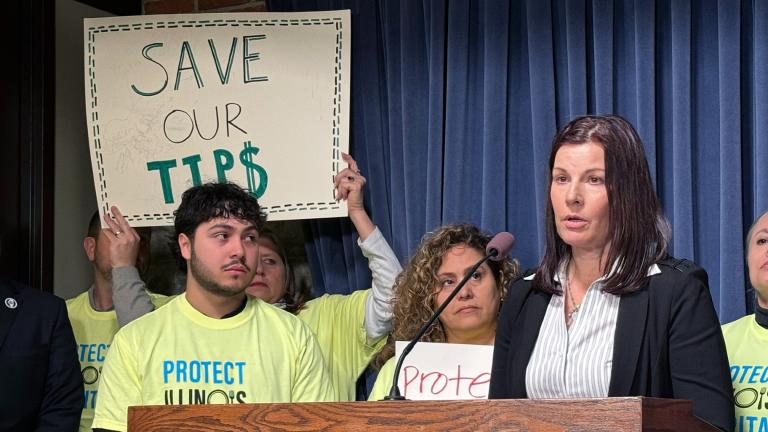HRA E PBLG
It may not look like Standard English, but these few letters actually mean “ladies and gentleman.”
It makes perfect sense to 19-year-old Zeke Alicea, who’s in his first year of court reporting school.
“The hard part when you first start getting into court reporting is learning the theory,” he explains while practicing before class.
That abbreviated theory is what allows court reporters to type so many words, so quickly.
At MacCormac College in the Loop, Alicea will need to be typing at 120 words per minute by the end of the semester. He’s already up to speed, he says, because of how much he practices.
“I come early before class, so I get two to three hours,” he says, calculating how much time he spends practicing. “Then, I have class which is about an hour and a half … I go home and practice for another three hours. So, it could be like six to seven hours a day.”
Alicea discovered the court reporting profession after being disappointed with his major at Marquette University – a four-year school that would’ve cost him about $50,000 a year, had he stayed.
“My mom tells me this now, because she’s a high school teacher as well. She tells me a lot of high schools stress the idea of pushing students to go to a four-year university and get that degree,” he says. “But I guess what it comes down to is job availability. I wasn’t very sure: If I get a degree in criminology, am I going to be able to find a job right away when I get out of college?”
More and more students, parents, educators and employers are coming to the realization that four-year schools – which sometimes saddle students with heavy debt – aren’t the right fit for all students.
Meanwhile, community colleges nationwide are working to provide skills and training that lead to jobs that don’t require a four-year degree.
Selana Scott runs MacCormac’s court reporting program.
She says as long as students put in the practice time, there’s a big payoff for them later.
“There are very few professions where you can go to school for this short amount of time and make that amount of money and have that type of flexibility also,” she says.
The average starting salary for a court reporter? $45,000. But the Bureau of Labor Statistics says the highest 10% of court reporters earn more than $100,000.
They work not only in the courtroom, but also for civil proceedings and in closed-captioning for television programming.
And those who work in the industry today say there’s a shortage.
“I read somewhere that mean age of a court reporter right now is 52. So we are a very old profession right now, there’s not a lot of new young people getting into it. That’s a big problem, the agencies just can’t cover all the jobs,” explains Greg Weiland, a freelance court reporter who’s been working in the business for 30 years.
Weiland says he gets more job offers than he can accept, which works to his advantage.
“There’s so much work out there right now that you can be picky like that, you can pick and choose work you want to take,” he says.
He hopes to see younger reporters, like Alicea, joining him in the profession soon.
For Alicea, once he can key 225 words per minute, he’ll have the security of a profession that’s just his type.
“I feel very settled, like I have everything planned out now,” he said. “I know that once I graduate, I’ll start working.”
Follow Brandis Friedman on Twitter @BrandisFriedman
Related stories:
FAFSA Verification an ‘Unfair Burden’ for Low-Income Students
A New Approach to Addressing Hunger in Higher Education
Unlimited Paid Time Off: Too Good to Be True?








